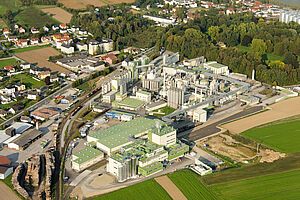Based on the energy flow analyses and a rough concept, the experts of the AIT Center for Energy prepared a feasibility study for a more climate-friendly processing of maize for AGRANA's Upper Austrian site in Aschach/Donau. The results show that by using a heat distribution network with flow temperatures of 75 - 95 °C, the current fossil-derived process steam can be reduced by 30% in a first step. With the integration of further consumers into the distribution network, savings of even 40% are possible. Implementation of the measures would mean a reduction in CO2 emissions of up to 23,000 tonnes per year. AGRANA's goal is to reduce its greenhouse gas emissions at all its sites to net zero by 2040.
At the AGRANA plant in Aschach, up to 1,450 tonnes of corn are processed daily into high-quality starch products for downstream industries. This requires large amounts of energy for cleaning and processing, which are currently provided by fossil fuels such as natural gas. Since process heat generation causes the largest share of CO2 emissions at the site, the recovery of waste heat offers great potential for the reduction of climate-damaging greenhouse gases.
In order to realise this potential, AIT, together with AGRANA's experts, developed a heat recovery network as part of a feasibility study, into which the waste heat sources existing at the site can be fed either directly or by means of heat pumps. Thus, the energy needs of a wide variety of processes can be met up to and including full supply via this hot water network.
The study also considered possible capacity expansions of the plant and the supply of additional heat demands.



